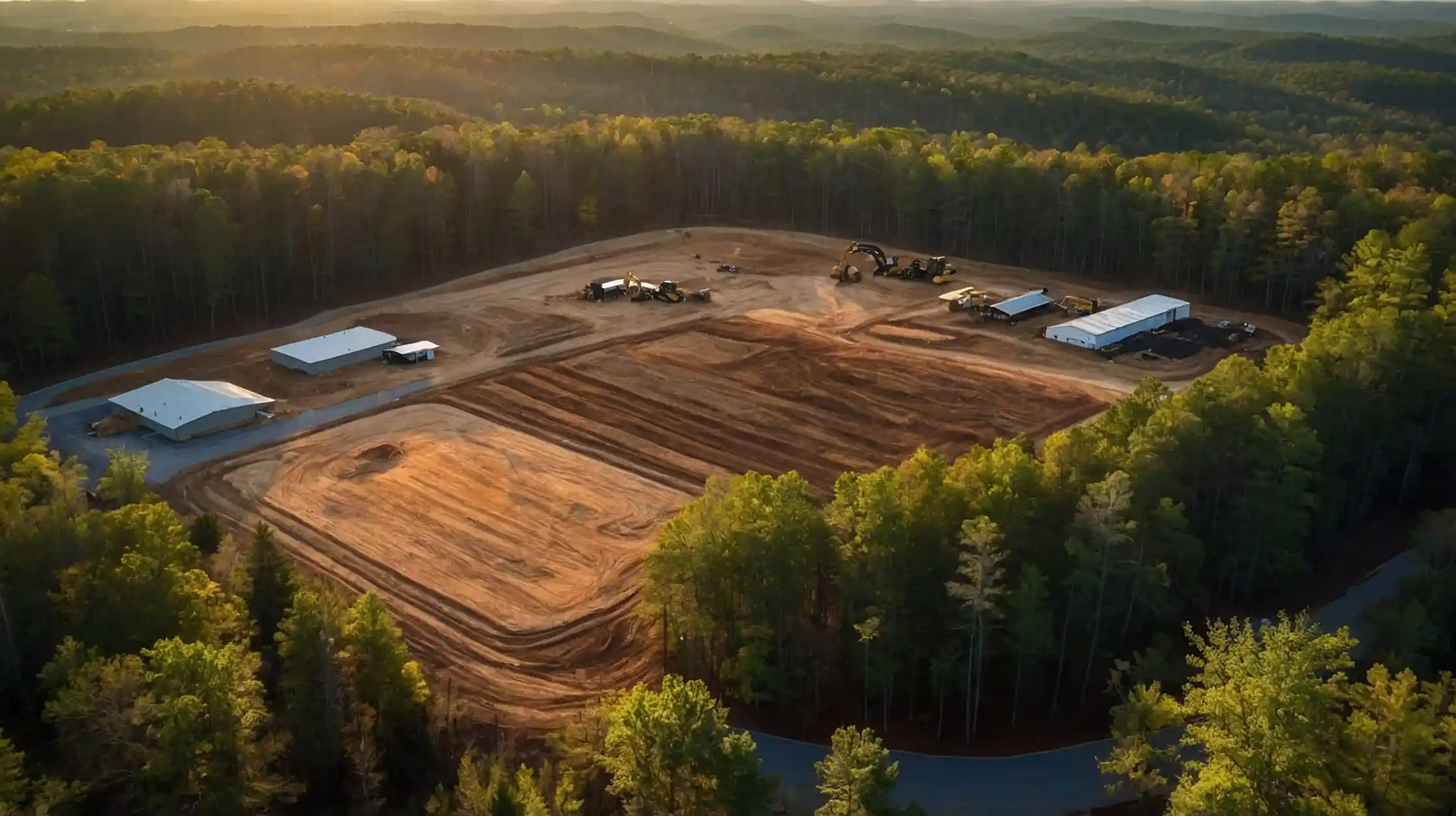The best places to develop land in North Carolina are the Research Triangle for tech-driven growth, Charlotte's expanding metro area, and emerging counties like Johnston and Chatham, where major employers create fresh demand.
With land prices varying from $5,000 to $500,000 per acre depending on location, understanding where to focus your search can significantly impact your returns.

Key Takeaways:
Research Triangle leads development opportunities with 9.5% tech job growth and consistent land value increases of 7-12% annually.
Charlotte's metro expansion, particularly along the Blue Line corridor, offers prime development potential with 50% population growth over two decades.
Emerging counties like Johnston (Amazon facility) and Chatham (VinFast plant) provide better value with strong growth fundamentals.
Top NC Markets for Rental Development
North Carolina's diverse real estate landscape presents unique opportunities for rental property developers in 2025. With median rents increasing 21.5% from 2020 to 2023 and continued growth projected, strategic land acquisition in high-growth areas can yield significant returns for rental investors.
Research Triangle Region: Tech-Driven Demand
The Research Triangle continues to dominate North Carolina's rental market, with tech sector expansion driving unprecedented demand for housing. Recent data shows:
9.5% projected tech job growth in 2025
Average rental yields of 7-12% annually
Consistent tenant demand from major employers like IBM, Cisco, and RTI International
The Triangle offers particularly strong opportunities for rental developers near tech campuses and educational institutions. Focus your search on:
Durham-Chapel Hill corridor for student housing developments
Morrisville-Cary area for tech professional housing
Wake Forest's expanding suburbs for family-oriented rentals
Charlotte Metropolitan Area: Banking on Growth
Charlotte's transformation into a national business hub has created a robust rental market. The city's 50% population growth over two decades shows no signs of slowing, with specific areas showing exceptional promise:
University City: Tech corridor expansion driving rental demand
South End: Young professional rental market with premium rates
Ballantyne: High-end suburban rental opportunities
Pro tip: Focus on areas along the Blue Line light rail expansion, where transit-oriented development has shown rental premium increases of 15-20% compared to non-transit areas.
Emerging Growth Counties
Several counties outside major metros offer exceptional value for rental developers in 2025:
Johnston County: Amazon's facility creating rental demand surge
Chatham County: VinFast's $4 billion plant driving worker housing needs
Cabarrus County: Charlotte spillover creating premium rental opportunities
Brunswick County: Coastal location commanding 15% higher rental rates
Market Selection Strategy
When evaluating markets for rental development, consider these key factors:
Job growth projections (aim for 3%+ annual growth)
Population growth trends (target 5%+ annual increase)
Infrastructure improvements (especially transportation)
Major employer announcements
Zoning friendly to rental development

Finding Development-Ready Land
The journey from raw land to profitable rental property begins with finding the right parcel. North Carolina's diverse landscape offers everything from urban infill opportunities to suburban development tracts. Success in today's competitive market requires combining modern search techniques with traditional networking.
Digital Research Methods
Start your search using North Carolina's comprehensive online resources. County GIS mapping systems provide insight into zoning, utilities, and future development plans. Modern land investors who leverage these digital tools often identify promising parcels before they hit traditional market listings.
County GIS portals for property data and zoning information
FEMA flood maps and environmental overlays
Department of Transportation's future road plans
North Carolina Soil & Water Conservation District reports
Working with Land Specialists
While online research is crucial, local expertise remains invaluable in North Carolina's dynamic market. Professional land specialists can provide insights into off-market opportunities and potential development challenges not apparent from digital research alone.
Key Professional Relationships:
Land specialists with Accredited Land Consultant (ALC) designation
Civil engineers familiar with local rental development requirements
Environmental consultants specializing in NC regulations
County planning department officials
Off-Market Acquisition Strategies
Some of the best development opportunities never appear on public listings. Many property owners work directly with land buyers in North Carolina rather than listing on the open market, especially when their land has development potential.
"We're seeing more landowners taking a strategic approach to selling their properties in 2025. Rather than listing undeveloped land on the open market, many are choosing to work directly with established buyers who understand development potential and can offer fair, straightforward transactions," explains Emma Dozema, Land Acquisition Specialist at Prime Land Buyers.
Alternative Sourcing Methods:
Direct mail campaigns to target area property owners
Local real estate investment group networking
County tax sales and auctions
Estate sales through probate courts
Understanding Site Selection Criteria
When evaluating land for rental development, certain factors become critical to success. Consider these essential elements before making an offer:
Proximity to employment centers and amenities
Access to public transportation
Utility availability and capacity
Topography and development costs
Future growth corridor location
Professional Support Resources
Finding the right property often requires professional assistance. If you're looking to invest in North Carolina land for development, working with experienced land buyers who understand the local market can save time and prevent costly mistakes. Companies like Prime Land Buyers specialize in identifying and evaluating development-ready parcels across North Carolina.
Due Diligence Essentials
Once you've identified a potential property, thorough due diligence becomes critical. Experienced developers always verify these key elements before purchase:
Zoning compatibility with rental development
Environmental assessments
Title search and survey review
Utility verification and capacity checks
Local rental market analysis

Development Considerations for Rental Properties
Converting raw land into profitable rental properties requires careful planning and attention to specific development factors. Today's successful rental developments must balance construction efficiency with features that attract long-term tenants. Thoughtful developers focus on both immediate build costs and long-term operational efficiency.
Zoning and Regulatory Requirements
North Carolina's rental development regulations vary significantly by county and municipality. Understanding local requirements early in the process can prevent costly delays and redesigns.
Multi-family zoning restrictions
Density requirements
Parking minimums
Green space requirements
Stormwater management regulations
Infrastructure Planning
Rental properties demand robust infrastructure to support multiple units and common areas. Planning for these elements during the development phase can significantly reduce future maintenance costs and tenant turnover.
Essential Infrastructure Components:
Water and sewer capacity for multiple units
Electrical service planning for peak demands
High-speed internet infrastructure
Internal road networks and access points
Cost Considerations Specific to Rentals
Development costs for rental properties include unique elements that might not apply to single-family or commercial developments. Understanding these costs helps create more accurate project budgets.
Major Cost Categories:
Common area development and amenities
Security infrastructure and access control
Durable material selection for high tenant turnover
Maintenance-friendly design elements
Property management infrastructure
Financing and ROI Analysis
Converting raw land into rental property requires careful financial planning and realistic return projections. Today's successful rental developers understand that proper financial structuring can be as important as physical development. North Carolina's diverse market demands equally diverse financing approaches.
Development Financing Options
Traditional construction loans only tell part of the story. Competent developers often layer multiple financing sources to optimize their capital stack and maximize returns.
Primary Funding Sources:
Construction loans (65-75% LTC typical)
Private equity partnerships
Mezzanine financing
Local development incentives
Opportunity Zone funding
Understanding Development Costs
Accurate cost projections help prevent budget overruns and financing shortfalls. Today's rental developers must account for hard and soft costs throughout the project lifecycle.
Major Cost Categories:
Land acquisition (20-30% of total project cost)
Site preparation and infrastructure
Vertical construction ($150-200 per sq ft)
Soft costs (15-20% of hard costs)
Contingency (10-15% minimum)
Rental Market Analysis
Understanding local rental dynamics helps project realistic revenue streams. Current North Carolina rental trends show strong demand across multiple property types and price points.
Key Analysis Points:
Current market rents by unit type
Absorption rates in the target market
Vacancy trends and projections
Competitive amenity packages
Operating expense ratios
Conclusion
North Carolina's rental development opportunities span urban tech hubs and emerging rural markets. Success comes from choosing the right location and executing innovative development strategies.









